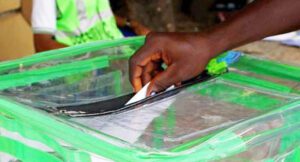Modifying strategies to tackle illicit drug production networks
Rates of transactions in hard drugs have had their records of grave concern in Nigeria. Efforts by the government to tame the stretch of the illicit production of narcotics and the network of operations around same have informed records of recurring arrests, in attempt to clamp down on cartels and barons who have established illicit structures for trade in hard drugs.
It is no doubt that transactions in hard drugs have had their blow on the Country. From political and socioeconomic waves to environmental impacts, the menace around such transactions have had their negative records. The recent spread of drug abuse has become worrisome, particularly as the prevalence as seen with health hazards worsening among youths recently, have raised concerns. The adverse effects of substance abuse in the Country have further worsened the profile of health status of the Nigerian demography, particularly as the youths who are negatively exposed to the syndrome of substance abuse have mostly become affected, a subject that threatens productivity with depth of disadvantages to socioeconomic fabrics. The health hazards posed by the syndrome recently have been noted to be one major issue of concern within the health and social fabrics of the Country among her populace.
Recently, efforts on the part of the government, particularly through the National Drug Law Enforcement Agency, (NDLEA), has yielded much more records of hard approaches with the use of force to clamp down on cartels and their networks of operation. However, it seems there would be more to the deployment of hard mechanisms which have received applause in records of continuous arrests and seizures.
It is essential to develop strategies for a more proactive framework for the war against the menace of hard drugs in the Country.
Presenting this necessity at the third committee session of the ongoing 78th United Nations General Assembly (UNGA), in New York, USA on Monday, 2nd October, 2023, the Chairman/Chief Executive Officer of the National Drug Law Enforcement Agency, (NDLEA), Brig. Gen. Mohamed Buba Marwa (Retd) told the forum that the agency is planning alternative development strategies that will take drug cartels out of business and protect the environment from the damaging effects of illicit drug cultivation and production.
According to him, “Cartels involved in illicit drug cultivation are causing deforestation, resulting in environmental degradation. In search of a lasting solution, we are working to implement an alternative development plan. This will provide cannabis farmers with better options, like agricultural loans and improved seedlings. The increasing online activities of drug traffickers, particularly on the dark web, after the COVID-19 pandemic have become a great source of concern.
“This will require collaboration and capacity-building to neutralise the growing threat. Nigeria is also strengthening its legal framework through ongoing amendments to relevant drug laws. Our bilateral and multilateral cooperation efforts have been expanded through the signing and renewal of memoranda of understanding with countries and agencies. This has helped to deepen intelligence sharing, exchange programmes, joint operations, and capacity building, among others,” he said as quoted in a press statement signed by the Agency’s Director on Media and Advocacy, Femi Babafemi.
“More policies to protect vulnerable groups such as women, children, and displaced persons will be implemented. To maintain a clear lead over drug trafficking groups, we will continue to engage in thoughtful regulations and targeted strategic law enforcement that are intelligence-led and human rights-centred. We will also leverage stakeholder collaboration as we make progress in the implementation of the SDGs. No stone must be left unturned, and no community, group, or individual must be left behind. We must extend the fight against drugs on all fronts and ensure that our communities are safe, healthy, and peaceful,” he told the global gathering.
He added that Nigeria is adopting a whole-of-society approach to countering the challenges of drug trafficking in line with the 2030 SDG agenda, which seeks to promote the rule of law, health, peace, and justice.
“Therefore, while ramping up law enforcement efforts to halt the illicit supply of drugs, we are equally promoting evidence-based drug prevention, treatment, and care programmes,” Marwa said. While stating that Nigeria is concentrating efforts on mitigating the challenges of narcotic drugs, he declared that “the drug demand reduction strategies are also helping to address the problem of stigmatisation and discrimination against people with drug use disorders. This includes the introduction of a 24/7 toll-free call centre where people can call from the comfort of their homes to access quality counselling, treatment, and care.”
“Remarkable progress has also been made in early prevention programmes in schools and communities. This is in accordance with SDG 3, which seeks to promote good health and well-being. One of the approaches is to build the capacity of young people and provide them with the basic coping skills they need to succeed in life. The Nigeria Drug Law Enforcement Agency (NDLEA), in collaboration with the United Nations Office on Drugs and Crime (UNODC) and the MTN Foundation, is promoting the Unplugged Drug Programme in schools.
“I am glad to inform you that the implementation of the National Drug Control Master Plan (NDCMP) 2021–2025 is in its third year. This is Nigeria’s strategic document for addressing the world drug problem. One of its advantages is the involvement of stakeholders at all levels of government. The master plan provides a multi-agency intelligence-led model that is aimed at disrupting drug trafficking cartels and targeting illicit drug assets and wealth. In addition to the NDCMP, there is the War Against Drug Abuse (WADA) advocacy campaign, which provides stakeholders with a platform to promote anti-drug abuse enlightenment efforts. With this development, we have given equal opportunity to drug demand reduction and drug supply reduction efforts,” he said.
It is pertinent for the Government to build a formidable framework around the fight against hard drugs with responsive mechanisms potent to address the needs for control against hard drugs and all its network of transactional operation. The implementation of the National Drug Control Master Plan (NDCMP) 2021–2025 is in its third year. The need to fortify its building blocks with stronger complementary mechanisms to speak appropriately to the strongholds of the menace of hard drug networks in the Country is important.
Among this, raising awareness among various groups, including traditional rulers, students, religious leaders, and other opinion leaders is a necessity that must be rightly articulated to raise resistance against the menace of drug abuse and the need to address it, as well as breaking the chains of transactions around the illicit system.




